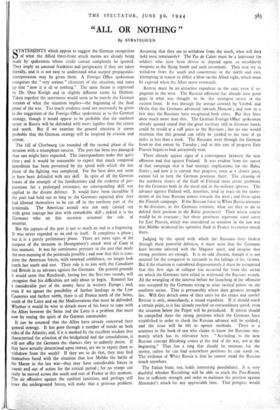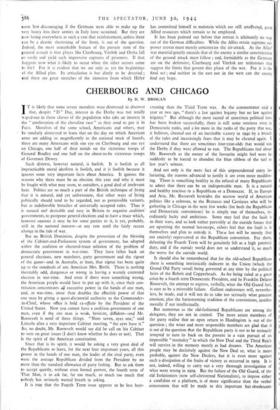"ALL OR NOTHING "
By STRATEGICUS
STATEMENTS which appear to suggest the German recognition of what the Allied three-front attack means are already being made by spokesmen whose credit cannot completely be ignored. They imply an unusual frankness and perspicacity if they are taken literally, and it is not easy to understand what warped propaganda- interpretation may be given them. A Foreign Office spokesman recognises the " very serious " character of the situation, and sums up that "now it is all or nothing." The same theme is expressed by Dr. Otto Kreigh and in slightly different terms by Dittmar. Taken together the statements would seem to be merely the German version of what the situation implies—the beginning of the final phase of the war. Too much credence need not necessarily be given to the suggestion of the Foreign Office spokesman as to the German strategy, though it would appear to be probable that the southern sector in Russia will be defended with more rigidity than the centre and north. But if we examine the general situation it seems probable that the German strategy will be inspired by evasion and retreat.
The fall of Cherbourg has rounded off the second phase of the invasion with a triumphant success. The port has been less damaged than one might have expected. The correspondents make this quite clear ; and it would be reasonable to expect that much congenial demolition has been prevented by the speed with which the last phase of the fighting was completed. For the base does not seem to have been defended with any skill. In spite of all the German boasts of the strength of the fortifications and the evidence of pre- parations for a prolonged resistance, no corresponding skill was applied to the distant defence. It would have been incredible if the port had held out as long as the Germans expected after they had allowed themselves to be cut off in the northern part of the peninsula. The American assault was not only carried out with great courage but also with remarkable skill ; indeed it is the Germans who on this occasion assumed the role of amateur.
But the capture of the port is not so much an end as a beginning. It was never regarded as an end in itself. It completes a phase ; but it is a purely preliminary phase. There are more signs of the purpose of the invasion in Montgomery's attack west of Caen at this moment. It was his continuous pressure in the east that made the over-running of the peninsula possible ; and now that this is com- plete the American forces, with renewed confidence, no longer look north but south and east. Their role is to join with the Canadians and British in an advance against the Germans. On general grounds it would seem that Rundstedt, having lost the first two rounds, will recognise that his difficulties are only about to begin. Rommel has a considerable part of the enemy force in western Europe ; and, even if we ignore the possibility of further landings in the Low Countries and farther north, there is all France north of the Seine, south of the Loire and on the Mediterranean that must be defended. Whether it would be wise to detach more of his force to cope with the Allies between the Seine and the Loire is a problem that must now be vexing the spirit of the German commander.
It can be assumed that the Allies have already concerted their general strategy. It has gone through a number of minds on both sides of the Atlantic; and, if it is marked by the excellent wisdom that characterised the selection of the bridgehead and the consolidation, it will not offer the Germans the chances they so ardently desire. if they have actually determined upon retreat, are we to expect them to withdraw from the south? If they are to do that, they may find themselves faced .with the situation that lost Moltke the battle of the Marne in the last war—they may have considerable forces in transit and out of action for the critical period ; for no troops can easily be moved across the south and east of France at this moment. The air offensive against the cardinal junctions, and perhaps still more the underground forces, will make that a grievous problem.
Assuming that they are to withdraw from the south, what will they hold most tenaciously? The Pas de Calais must be a lodestone for soldiers who have been driven to depend upon so unsoldierly weapons as the flying bomb and such inventions. They may try to withdraw from the south and concentrate in the north and east, attempting in transit to inflict a blow on the Allied right, which must be exposed when the Allies move eastwards.
Retreat must be an attractive expedient in the east, even if re- pugnant in the west. The Russian offensive has already torn great gaps in what was thought to be the strongest sector of the eastern front. It was through the avenue covered by Vitebsk and Orsha that the Germans advanced towards Moscow ; and now in a few days the Russians have recaptured both cities. But they have done much more than this. The German Foreign Office spokesman already quoted stated that the great territory still in German hands could be resold at a stiff price to the Russians ; but no one would maintain that this ground can safely be yielded to the tune of 5o miles in less than a week. The Russians were through the German front to that extent by Tuesday ; and at this rate of progress East Prussia begins to look attractively near.
There already appear signs of a convergence between the new offensive and that against Finland. It was evident from the outset of that campaign that it had strategic implications for the Baltic States ; and now it is certain that progress, even at a slower pace, cannot fail to turn the German positions there. The clearing of the northern shores of the Gulf of Finland must create problems for the Germans both in the naval and in the military spheres. The advance against Finland will, therefore, tend to react on the move- ments of the four Russian armies towards the west ; and these upon the Finnish campaign. If the Russian force in White Russia amounts to 8o divisions, as the Germans estimate, what are they to do to defend their position in the Baltic provinces? Their wisest course would be to evacuate ; but these provinces represent some cover for East Prussia, which was considered so sensitive in the last war that Moltke weakened his operative flank in France to counter-attack there.
Judging by the speed with which the Russians have broken through these powerful defences, it must seem that the Germans have become infected with the Maginot spirit, and imagine that strong positions are enough. It is an odd illusion, though it is not unusual for the conqueror to succumb to the failings of his victims. But if the situation is considered dispassionately it must be recognised that this first sign of collapse has occurred far from the sector on which the Germans have relied to withstand the Russian assault. All the wrangling of the interval before the launching of the offensive was occupied by the Germans trying to seize tactical points on the southern sector. That is presumably where their greatest strength- lies. Will they detach some of their units for the centre and north? Retreat is only, immediately, a sound expedient. If it should reach a certain point, as it has already reached an extraordinary speed, even the situation below the Pripet will be prejudiced. If retreat should be compelled there the strong positions which the Germans have established in order to check the Russian advance will be yielded ; and the issue will be left to opener methods. There is a sentence in the book of one who claims to know the Russians inti- mately which has its relevance here. "According to the new Russian concept Blitzkrieg comes at the end of the war, not at the beginning." That has a ring that should be ominous for the enemy, unless he can find somewhere positions he can stand on. The evidence of White Russia is that he cannot stand the Russian attack anywhere.
The Italian front, too, holds interesting possibilities. It is very doubtful whether Kesselring will be able to reach the Pisa-Rimini line in sufficient strength and order to maintain the position against Alexander's attack for any appreciable time. That prospect would seem less discouraging if the Germans were able• to make up the very heavy loss their armies in Italy have sustained. But they are now losing everywhere at such a rate that reinforcement, unless there can be a drastic shortening of the front, is out of the question. Indeed, the most remarkable feature of the present state of the general assault is that places like Cherbourg, Vitebsk and Orsha fall an easily and yield such impressive captures of prisoners. If that happens now what is likely to occur when the other sectors come to life? For it is evident that we see only as yet the beginnings of the Allied plan. Its articulation is but dimly to be descried ; and there are great stretches of the immense front which Hitler has committed himself to maintain which are still unaffected, great Allied resources which remain to be employed.
It has been pointed out before that retreat is ultimately no way out of the German difficulties. While the Allies retain supreme air- power retreat must merely concentrate the air-attack. As the Allies' war material greatly exceeds that of the enemy a similar concentration of the ground attack must follow ; and, formidable as the Germans are on the defensive, Cherbourg and Vitebsk are milestones that suggest the limits that govern this phase of the war. For it is the final act ; and neither in the east nor in the west can the enemy find any hope.































 Previous page
Previous page